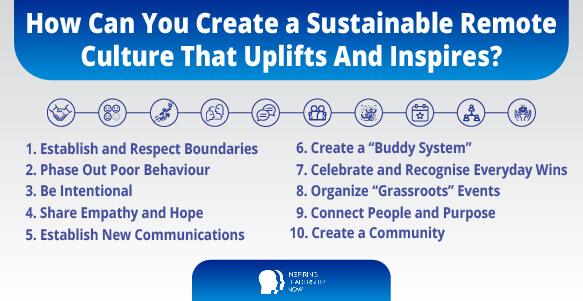Last updated: 29 September 2021

Corporate culture is much more than the physical office. And now with reduced office-based working, you may have noticed the impact that a corporate culture (or lack of it) can have on both you and your coworkers. This article will explore the importance of a collective, work-based culture and offer you how to create a sustainable remote work culture that both uplift and inspires your team.
Maybe you have found yourself missing those small and often spontaneous interactions with your colleagues, the bouncing of ideas, a buzz of collaborative interaction.
Perhaps you miss that general feeling of belonging to and working for something greater; a common goal that brings you together?
This is all part of the corporate culture.
Essentially corporate culture comes from, is based upon, the values on which your organization is founded.
When these values are embodied by leaders and managers they become the glue that sticks everyone together.
Corporate culture within a physical space is easier to maintain than in a remote setting.
This is not a direct result of the physical elements of the office space, such as the coffee machine or the office lounge area!
It is because the act of physically being together, with all the interactions that occur in that space, helps your vital workforce feel included and understood.
The lack of this, in a remote work setting, for example, is a stark contrast to the sense of belonging in the shared, face-to-face culture of the office.
You could be forgiven for thinking that without daily, physical interactions that the corporate glue holding your team together could be all but washed away.
The good news is that this is not the case.
Building and sustaining a corporate culture in a remote setting is challenging, but not impossible. It just takes a little thinking about a little awareness and some planning.
Fortunately, the real glue that holds you and your coworkers together is not the visible artifacts of the office, but corporate habits. These habits are based on values – and these can be applied anywhere.
Why Are Businesses Creating Remote Work Cultures?
It is very unlikely to have escaped your attention that in the last twelve to eighteen months there has been a huge paradigm shift brought to the world of work, and the world at large, by the Coronavirus pandemic.
This has meant that workforces worldwide have been forced to go remote.
Remote working was a concept that was trialed by tech giant IBM in 2008 for example, when it sent forty percent of its workforce to work from home.
This was then phased out eight years later when it brought its people back into the office.
The reason being that without person-to-person rapport and mutual experiences, it was found that it was difficult to utilize the company’s shared practices and beliefs to glue together a remote workforce.
The phenomenon of remote working brings a challenge because they lack of human in-office interaction means less creativity, less problem solving and less collaboration between employees. It also means less understanding.
According to Jennifer Howard Grenville in How to Sustain Your Organization’s Culture When Everyone is Remote, people understand each other better when they share common experiences and nonverbal communication.
In a face-to-face environment, the values, beliefs, and practices that underpin the organization are widely adopted as a shared experience.
Take away that shared experience and some of those values, beliefs and practices can start to dissipate.
The importance of having a strong corporate culture is that it supports an all-important sense of belonging, creativity, collaboration, understanding, and problem-solving.
The benefits of creating a remote work culture are that all of these positive (vital, one could argue) qualities become, and form, the basis of day-to-day working life, even in the absence of physical interactions.
What is the Basis of a Work Culture?
The basis of work culture is defined by the way your people make decisions and how they work collaboratively.
These are what are known as your corporate habits. The things around the office, such as the social area or the foosball table are simply devices for promoting interaction which helps cement the corporate culture and its values.
Your understanding of, and how you use the corporate habits, namely how you approach decision making and collaboration, defines whether you are a member of the culture.
The practices of decision-making and collaboration, although often unconscious, are your company’s cultural tool kit.
If you embrace and consciously use them you are literally embodying the culture and values inherent within it.
This means that you are setting examples for others, by modeling the corporate values, and inspiring them to follow – which is leading from the front in an uplifting and sustainable way.
Merely writing down values doesn’t cut it. You have to live it, work it in fact!
Effectively company culture is reflected in what your people do. If you want to create and preserve a particular culture it is up to you to clarify and model these types of behaviors and values to your remote workforce.
For example, your organization defines itself as “pioneering” there might be an ethos of proactive problem solving and encourage those who thrive in switching priorities rapidly and finding solutions where no one else knew there was a problem.
You have to know this and model this for it to be taken up by others you lead and for it to become a culture.
A solid, well-established, work culture also functions as a set of boundaries from which to guide your team.
If a situation arises that clashes with the corporate culture it is your role as leader to address it.
In such occurrences, it is your knowledge of the culture, and its importance, that gives you a basis for discussion and flexibility, or options, around the boundaries.
The foundations of remote work culture should be rooted in the values that underpin and therefore define the organization – the starting ideals of your company.
These are the things that are important, the fundamentals, the non-negotiables if you will. For example, these core values might be something like collaboration, respect, innovation, inclusion, betterment – or whatever is apt for your business.
How Can You Create a Sustainable Remote Culture for Your Business?

Changing times, such as a drastic and unexpected shift to remote working during a pandemic, for example, present the perfect opportunity to revisit values and reinforce what is important about your organization. It is up to you to know why these things matter because during tough times these values function as the glue that both brings your people together and nourishes them at the same time.
How to create a remote culture for your business? This is the ILN top pick from industry experts worldwide and featured by Forbes:
Establish and Respect Boundaries
Establishing and respecting new boundaries and deep-rooted company values is a key way to sustain your work culture in a remote environment, says Rakhi Voria of IBM.
In fact, IBM has adopted a Work From Home Covid Pledge, signed by thousands of employees to counteract the chaos, stress, and turmoil that the pandemic brings. This pledge serves to put people first and focus on wellbeing as a new baseline.
Phase Out Poor Behaviour
Be quick to identify and eliminate elements that run contrary to your company’s culture. The change in workplace culture to remote culture is an opportunity to phase out poor behaviors.
Hugo Harris of PwC, Australia advises looking at what interactions worked for your company and where it makes sense, take them online (without forcing everything to go digitally interactive – add value without forcing the issue).
This is the time to establish a balance in adapting to the new normal by maintaining the good from before in ways that translate to remote interactions.
Be Intentional
It’s easy to strike up a conversation in the office and for it to seem that it was intentional. Many leaders can hide behind spontaneity as a mask for a lack of intentionality, says Mark Kosoglow of Outreach.
Creating a remote work culture as a structure for your people to lean into means being intentional. Put things on the calendar, create reminders and to-dos, drop in for a quick pulse survey, make adjustments to performance review topics. Staying intentional in this way means staying connected.
Share Empathy and Hope
The ability to genuinely empathize with your team is a hallmark of a good leader. Be aware of how others are feeling and take time to understand.
From this place of understanding, move quickly to sharing hope, says Marcus Jewell of Juniper Networks INC.
Staying too long in the empathy phase can lead to apathy, so transition sensitively and swiftly to a vision of hope. Communicating vision after having cared for your employees is what sets you apart as a leader (not simply a manager).
Establish New Communications
Ensure that you have appropriate and accessible communication platforms in place to allow communications across your employees base, such as chat platforms.
This also means that there is more opportunity for spontaneous interactions, which happens all the time in an office setting.
Being remote means not being able to stop by and say hi, so to keep up the cadence in comms requires more intentionality behind communications and having the platforms to do this says Bobby Matthews of Skybridge Americas, Inc.
Create a “Buddy System”
At Secure One Capital Corporation, Beau Barnhart says that their approach to creating a remote work culture has been to pair each person with a new “buddy” on a weekly basis.
Week on week the company creates a business-related challenge for the pair to work on together; how best to solve or answer it.
The reason for this is because working towards a common goal in a competitive environment creates the strong camaraderie that you want in a high-performing team. This camaraderie, communication, and performance sustain the culture of those precise values.
Celebrate and Recognise Everyday Wins
Without the diversity, variety, and interaction of an office environment, working from home can feel monotonous in comparison – particularly in times of quarantine.
In order to connect teams in a disconnected time, Melanie Hicks from MGT of America has increased team-sharing of quarantine creativity, stories, and photos as a way to build community and raise spirits.
Having these points of connection and lightheartedness she views as critical components to getting through tough times.
Organize “Grassroots” Events
Forget corporate-type functions (which, let’s be honest, are usually pretty sterile at best, just boring at worst) – why not organize fun virtual events with live video.
Support those in your organization who want to take charge with ideas and funds to hold events.
According to Ryan Northington of Simplus, this helps foster camaraderie, culture, and trust. You could even follow the example of Adam Mendler at The Veloz Group and create a virtual speaker series to help build and sustain company culture.
Connect People and Purpose
When working remotely it is super important to keep your people engaged and remind them why their work matters, says Alexander Divinsky of RMG Media.
A good leader makes sure that everyone understands their heart in the bigger picture. If your team understands how their work impacts the greater whole they are more inclined to be involved and stay motivated, even in a remote location.
Create a Community
Community is the glue that brings and holds your coworkers together. It is an essential element in any culture and one of the biggest challenges in a remote environment according to Sarah Knapp of Spruce Technology.
She recommends using technology to create a virtual location where team members can talk about business and non-work topics. Even in this remote environment, she advises meeting in person, if only once a year, to help build real relationships that can be readily maintained remotely.
Major Takeaways
Creating a remote work culture is challenging, but not impossible. By knowing your company values, understanding why they are important and modeling them to others you have a powerful cultural tool kit, to motivate, engage and inspire others with.
A well-established culture of values functions not only as a source of camaraderie (unity through a common goal) it is also as a set of boundaries from which to guide your team.
Having this in place means that you are able to phase out behaviors that are not in line with company culture and encourage those that are.
Corporate culture is more challenging to maintain when most of your team are working from home, however with conscious actions such as being intentional, connecting people, and creating a community you can create it.
With attention to communication, empathy, buddying up, celebrating wins, grassroots events, and awareness, you not only sustain a remote work culture, but you also foster collaboration, understanding, and inspiration.
This is the real cultural glue that holds even the most remote of teams together.

